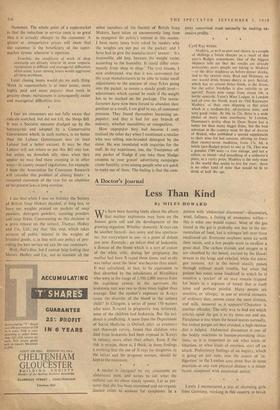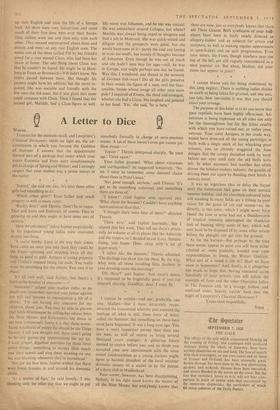A Doctor's Journal
Less Than Kind
By MILES HOWARD E have been hearing lately about the effects that nuclear explosions may have on the human germ cell and the development of the growing organism. Whether 'domestic' X-rays can be another hazard—less noisy and less spectacu- lar, but everywhere in use—is a point of debate just now. Example : an infant died of leukaemia, a disease of the blood which is a sort of cancer of the white cells; during her pregnancy the mother had been X-rayed three times, and as she was rather stout the 'dose' was heavier than usual. It was calculated, in fact, to be equivalent to that absorbed by the inhabitants of Hiroshima who were in the range of 1,500-2,000 metres from the explosion centre; in the survivors the Jeuktemia rate was two to three times higher than average. Did the mother's exposure to X-rays cause the disorder of the blood in the unborn child? In Glasgow, a series of some 150 women who were X-rayed in pregnancy was reviewed; none of the children had leukaemia. But the evi- dence is conflicting. A team from the Department of Social Medicine at Oxford, after an extensive and thorough surrey, found that children who died from feukzemia had been exposed to X-rays in infancy more often than others. Even if the risk is minute, there is, I think, in these findings a warning that the use of X-rays for diagnosis, in the infant and the pregnant woman, should be kept to the minimum.
* *
A reader is intrigued' by my comments on abdominal pain, and writes to ask what the sufferer can do about windy spasms. Let us pre- sume that she has been examined and no organic disease exists to account for symptoms. In a patient with 'abdominal discontent'—discomfort, wind, fullness, a feeling of uneasiness within— this is what one would expect. Most of the gas found in the gut is probably not due to the fer- mentation of food, but is nitrogen left over from swallowed air. Everyone swallows some air with their meals, and a few people seem to swallow a great deal. The carbon dioxide and oxygen in it are absorbed by the bowel, carried by the blood- stream to the lungs and exhaled, while the nitro- gen remains. Air in the bowel usually paSse4 through without much trouble, but when thel patient has eaten some foodstuff to which he is sensitive a 'pocket' of air may remain trapped for hours in a segment of bowel that is itself- tense and perhaps painfuL Many people are sensitive, or 'allergic,' to one or several elements of ordinary diet; onions cause the most distress, and milk, innocent as it appears. Chocolate is another offender. The only way to find out which article's upset the gut it to try them out and see. Flatulence is less when the bowel moves normally, but violent purges are best avoided; a high-residue diet is helpful. Abdominal discontent is one of the bodily reactions to tension-provoking situa- tions, so it is important to ask what kinds of situation, or what kinds of emotion, start off an attack. Preliminary findings of an inquiry, which is going on just now, into the causes of 'in- digestion' in the London area show that in some practices at any rate physical disease is a minor factor compared with emotional unrest.
* *
Lately 1 encountered a trio of charming girls from Germany, working in this country to brush up their English and taste the life of a foreign land. All three were very industrious and spent much of their free time bent over their books. They seldom went out and then only with each other. They seemed unconcerned about dates and dances and men—at any rate English men. The senior one of the three (called Fifi by her friends) pined for a man named Claus, who had been her swain at home. The odd thing about Claus was that he couldn't be found. He might be in Ham- burg or Essen or Brunswick—Fifi didn't know. No letters passed between them. She thought his parents might have his address, but she never in- quired. She was sociable and friendly with the few men she did meet, but it was plain that none could compare with Claus. Then I found that the second girl, Matilda, had a Claus-figure as well. His name was Johannes, and he too was mislaid. He was somewhere around Cologne, but where? Matilda was always being urged to emigrate and find a job in Montreal. She was quick-witted and diligent and the prospects were good, but she would have none of it—partly the cold and having to wear ear-muffs, but mainly (I thought) because of Johannes. Evert though he was out of reach and she hadn't seen him for ages—still, he was in Europe, and might perhaps one day be found. Was this, I wondered, one thread in the network of German folk-ways? Do all the girls preserve in their minds the figure of a man, real but inac- cessible, beside whose image all other men seem pale? I inquired of Emma, the third and youngest, whether she had a Claus. She laughed and pointed to her head. 'Yes,' she said, 'he is here.'



































 Previous page
Previous page